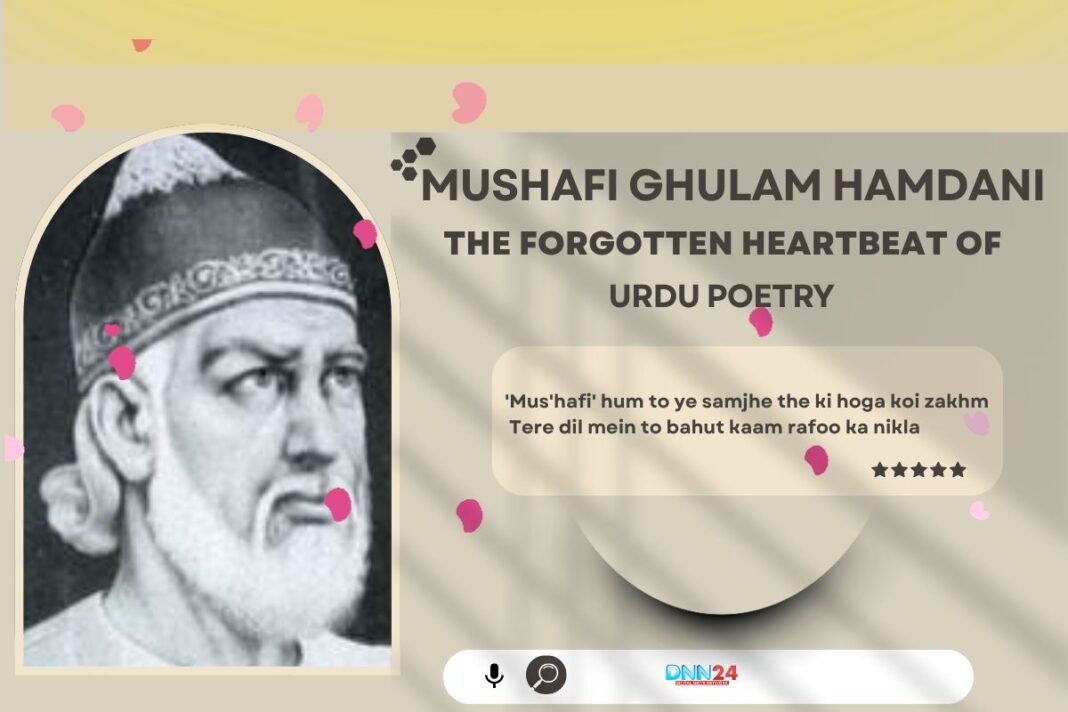Mushafi Ghulam Hamdani, born in 1750 in Amroha, never knew the comfort of lasting belonging. Wandering like a driftwood up the Ganges, the current of a conquered empire swept him along, and he had a heart bruised by fortune. Mushafi’s early years were steeped in classical education, Persian etiquette, and poetry—yet he was nothing like his arrogant contemporaries. He dressed in poverty as a medal; he did not want to become famous and lived at the margins. He lived with friends and wrote ghazals in dimly lit rooms, and his nights were full of secret words.
raat parde se zara munh jo kisu ka nikla
Mushafi Ghulam Hamdani
shoala samjha tha use main pa bhabhuka nikla
Nobody ever speaks of how Mushafi sold his poems to get a meal or of how he managed to hold on to that little hope despite all the incessant struggle. To Mushafi, poetry could not be sold; poetry was a letter to the world, and he wrote it in invisible ink. His solitude birthed verses that still pulse with longing: “Mere dukh ki inthaha kaun kare, Tera dard bhi to hai Mushafi” (Who will measure the depths of my sorrow? Your pain too, Mushafi, is but your own). In each line, he silently asked a small corner in the heart of his anxious reader.
log kahte hain mohabbat mein asar hota hai
Mushafi Ghulam Hamdani
kaun se shahr mein hota hai kidhar hota hai
Mushafi and the Disguised Lover: Unheard Stories
It is not only his poetry, but also the legends that sprang out of it–legends the world was afraid to print–that make Mushafi what he is. One night, an unknown woman in a veil came to his door and asked for a verse to heal her broken relationship. Mushafi heard, and gave chai, and made a ghazal which made the tears come out under her veil. He started, not only consoling her, but giving her a new voice, too: Aap ki yaad aayi raat andheray mein.
aae ho to ye hijab kya hai
Mushafi Ghulam Hamdani
munh khol do naqab kya hai
She disappeared and was never named, she was never named, but only in the poetry of Mushafi. Closest friends would afterward remember how fragments of this meeting found their way into his poems, interwoven with love and mystery. Mushafi did not receive the credit for many masterpieces he ghostwrote on behalf of other poets, and this is a dark secret in the Urdu literary history since the poets of Lucknow were glamorous. His pen turned into a container of anonymous suffering, heartbreak, and hope, and any story he did not narrate turned into generic emotion.
KHwab tha ya KHayal tha kya tha
Mushafi Ghulam Hamdani
hijr tha ya visal tha kya tha
Nazms Which Say: Ek Baar Muskura Do
It is only a gross understatement to refer to Mushafi as a ghazal poet. His nazms are boiling with the pain of lost contacts and fantasized opportunities. He did not write to emperors or nobles, but to all those who at some time in their lives felt pain in the dark. There is a little-known anecdote of his Lucknow days, of a frustrated love–Mushafi in love with a courtesan, whose brilliance matched her beauty, wrote, Ek baar muskura do, zindagi guzar jayegi.
jab tak ye mohabbat mein badnam nahin hota
Mushafi Ghulam Hamdani
is dil ke tain hargiz aaram nahin hota
The courtesan never smiled again, but the verse of his became a secret anthem in the kothas and under the lanterns in the doorways. The tales relate that later he used to recite it with eyes seeking a face beyond time, as though he hoped that the poem at last would induce that smile which eluded him. His biggest asset was that he transformed his emotional scars into a gift to all who read him, and each line was a discreet invitation: come, suffer with me, and have your wounds take refuge here.
is qadar bhi to meri jaan na tarsaya kar
Mushafi Ghulam Hamdani
mil ke tanha tu gale se kabhi lag jaya kar
Shayari of Shadows
It is impossible to write about Mushafi without going into the shadows—haunting themes of longing, loss, and loneliness that shade his Shayari. However, behind the sorrow was the strength, a desire to show his scars and yet love so much. Once, he picked up an orphan boy on the streets of Lucknow and sheltered him, trained him in the art of silent observation, and allowed him to practice copying verses.
jamuna mein kal naha kar jab us ne baal bandhe
Mushafi Ghulam Hamdani
hum ne bhi apne dil mein kya kya KHayal bandhe
This lad, unnamed, unknown, grew up to be a poet, and tales of Mushafi and his loving heart went round the back alleys. In even the darkest of his verses, Mushafi is full of hope. “Zindagi hai ek musafir ki tarah, Mushafi chali jaati hai raaston mein” (Life drifts like a lone traveler, Mushafi, it moves on roads unending). He fought the devils, but he never gave up hope- and this is the actual, unspoken magic of his work: the courage to brush the darkness and bring a flame back.
aashiq to milenge tujhe insan na milega
Mushafi Ghulam Hamdani
mujh sa to koi banda-e-farman na milega
Living Legacy-Unfinished and Eternal by Mushafi
Even in his final days, Mushafi Ghulam Hamdani lived, reading, teaching, and scribbling verses from his humble Lucknow haveli. He was deprived of fame and did not care about the critics; instead, he created his legacy by touching hearts rather than ears. He passed away in 1824, and his poems continued to live on as lullabies to the weary. His ghazals are heard today in contemporary songs, and his nazms are read in the isolated rooms of students.
kapDe badal ke aae the aag mujhe laga gae
Mushafi Ghulam Hamdani
apne libas-e-surKH ki mujh ko bhaDak dikha gae
He has become an inspiration to thousands of poets who identify themselves with his pain and strength. The story of Mushafi, which is so often overpowered by the larger histories, is not a tale of a depressive state but of incessant giving and sincerity. He reminds us that unheralded lives may illuminate generations: that love and hurt and forgiveness, written delicately in the invisible ink of empathy, may still heal the world. His tale is, in the very finest sense, a mirror–reflecting the muffled pain and silent strength of the soul in every hearer.
Also Read: Munawwar Rana: The Poet Who Wrote the World’s Tears
You can connect with DNN24 on Facebook, Twitter, and Instagram and subscribe to our YouTube channel.



